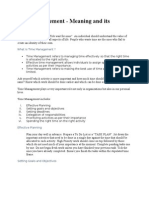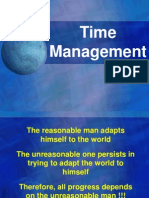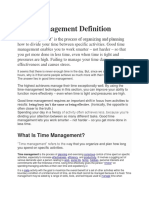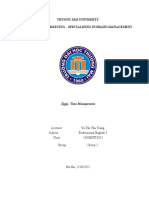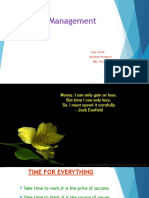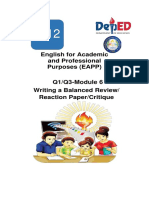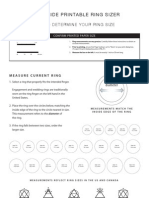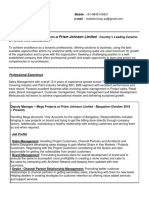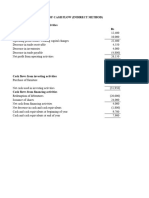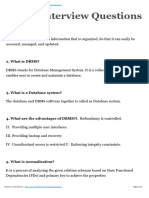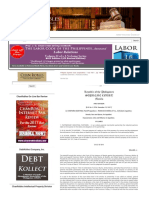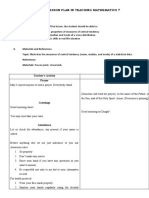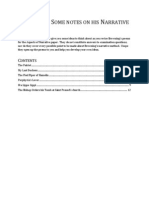INTRODUCTION
What, of all things in the world, is the longest and the shortest; the swiftest and the slowest; the most divisible
and the most extended;the most neglected and the most regretted; without which nothing can be done?
Which devours all the little and elivens all that is great? ---“TIME”
Time does not wait for anybody! Nor does the time elapsed ever returns! Therefore TIME
available should be utilized not only effectively but also judiciously.
TIME is a unique resource. But like money it can’t be accumulated! Neither it can be stored as
material goods nor it can be replaced as spare parts. It can never be switched “ON” & “OFF” like
a machine. TIME LOST IS LOST FOREVER.
Time is precious but our own time comes without price-tag! May be therefore without realizing
we keep on passing away time. We will not realize how the time passes away, unless we analyze
our normal daily routine. Generally we spend our whole day(24 hours) as follows:
Sleep (even for a normal adult 8hours sleep is necessary) – 8 hours
For office work - 8 hours
Traveling time - 2 hours
For physical hygiene - 1 hour
(say bathing, exercise etc.)
For taking food - 2 hours
For entertainment/ social meetings / personal habbits - 2 hours
----------------------
Total – 23 hours
Thus only, one hour is left for meaningful activities for our personal development/ goals etc.
but if this one hour is also lost then we can’t achieve our goal and we have short of time.
More often then not this one hour is lost in the activities which are rather unplanned such as
unscheduled guests, loose talks or gossiping around.
Time management isn’t just about doing more things; it’s about doing more things right.
Developing good time management skills will allow us to do the things we want to do as well
as the things we have to do. Time management is nothing but ….
SELF MANAGEMENT. It requires self discipline and control.
Often we could not do the things which we have decided to then we start feeling “We do not
have time”. This feeling of “not having a time” is not correct. Remember busiest man has got
time for everything and this is because he knows how to plan time!
Even though completion of any job/ necessity/ activity/ event requires time “EFFECTIVE
COMPLETION” of the same in minimum time requires planning.
Myths About Time Management
Since time management is life management, managing time is as complex as life itself is. On the
face of it, time management appears to be a simple mechanical affair with a clear relation
between cost and benefit or between input and output. In practical life, however, it may not be
exactly so. Let’s look at some of the myths or misconceptions about time management.
Myth 1:- The harder one works, the more he gets done.
Reality :- much depends on what is done and how it is done. Heaps of routine, trivial,
unimportant tasks would keep a person busy, but the results would not be satisfactory. Likewise,
�if one performs tasks that can be easily delegated to the lower echelons, it only shows his lack of
leadership.
Myth 2 :- People in higher positions make better decisions.
Reality:- sound decisions depend on the knowledge, experience, vision, commitment and
managerial competence of the decision-maker. The level at which a person is functioning is not
that important. In fact, people on the ground are more realistic in making decisions, for they are
better aware of the factors influencing the success or failure of decisional choices.
Myth 3:- Delay improves the quality of decisions.
Reality: - the truth is that delaying a decision makes it more complex and stale and its quality
eventually deteriorates. Rational and creative thinking at individual and group levels improves
the quality of decisions. In case this process takes longer than the usual time, the quality may still
be improved.
Myth 4:- Most people are overworked because of the nature of their job.
Reality :- Yes, the nature of the job does influence the extent of responsibility of a person.
Routine, repetitive activities, if large in number, might cause an increase in the workload of a
person. And in case there are deadlines to meet, it might cause further stress. On the other hand,
well-planned, well-managed assignments, requiring mind- application may not lead to lead
physical exertion. Nevertheless, much would depend on how a person handles a task. Thus,
lower competence may increase the workload even when the task is simple.
Myth 5:- Time can be saved.
Reality:- time can only be spent. The saved time also must be spent or invested immediately;
otherwise it would fly away. However, with proper planning, delegation, monitoring, application
of time savers and with the controlling of time- wasters, time can actually be saved.
Myth 6 :- If you do things yourself, tasks get done more efficiently.
Reality :- not true. Without delegation, an executive will have to do the entire task himself,
since no one else would have gained the experience of doing it. This approach will embroil an
executive in avoidable routine tasks.
Myth 7 :- Delegation would save you from worry and responsibility.
Reality :- wrong delegation might become a source of greater worry. Right delegation backed
by proper monitoring and supervision may reduce worry and lessen the burden.
Myth 8 :- Efficiency means effectiveness .
Reality :- efficiency is working more and getting more out of time. Effectiveness is about
achieving goals and targets. Hence, all efficiency may not lead to effectiveness. Being efficient
in a wrong task or at a wrong time would prove to be highly ineffective. Effectiveness means
achieving the best results and that would become possible by doing the right things in a right
manner at the right time.
ABOUT TIME WASTERS
�
An important struggle in human life is to make the best use of time and reduce or eliminate time
wasters. There has been a lot of debate on what a time waster is. A particular activity may be a
time waster for someone but may not be so for somebody else. However, a time waster is an
activity – deliberate or imposed – that has little or no utility or even has a negative consequence
for overall time management.
Time wasters are broadly of two kinds – personal and official.
Personal time wasters relate to one’s own personal life- physical, mental, emotional, familial and social.
Official time wasters on the other hand, pertain to the structure and procedures on the office and the
behaviour there in.
Both these sources of time wasters can further be classified into avoidable time wasters
and unavoidabletime wasters.
Avoidable time wasters are those which can be avoided and overcome or atleast
reduced in intensity through proper planning and careful effort.
Unavoidable time wasters are those which are outside one’s control and very few
of these can be overcome through planned initiative or action.
Avoidable personal time wasters:-
1. Oversleeping/ excessive sleeping/ unorganized sleeping.
2. Sleeping during the daytime on weekends and holidays.
3. Lying in bed lazily, hence, late day- start.
4. Frequent shopping, including window shopping.
5. Visiting friends aimlessly, over socializing.
6. High frequency of taking eatables, drinks, tea.
7. Reading too many novels and glossies on politics, lifestyle, films, sports
etc.
8. Spending long precious time on newspaper.
9. Being critical or irritable or angry as a matter of habit.
10. Hesitation in saying “no”.
Unavoidable personal time wasters:-
1. Waiting for guest on special occasion.
2. Unsatisfactory performance of household staff/ assistant.
3. Carelessness of family members about their health.
4. Low pressure in water taps; going out of the home or to the ground floor
to fetch water.
5. Waiting in the crowd for shopping at a specific mall or store.
6. Too many couriers coming throughout the day.
7. Uncooperative or hostile neighbors.
Avoidable official time wasters:-
1. Incomplete communication.
2. Lack of clarity about goals.
3. Low level of technical competence or job knowledge.
4. Inadequate training.
5. Wrong person on job- defective e placement policy.
6. Employees repeating the same mistakes.
7. Frequent teas/ coffee and the waiting time involved.
� 8. Not saying no when it ought to be said.
9. Forgetting to save data on the computer.
10. Slowing down the pace of work in case the deadline is far away.
Unavoidable official time wasters:-
1. Frequent calls from the boss.
2. Sitting with the boss without much work for he wants it.
3. Centralization in the office; inadequate delegation.
4. Lack of proper coordinative mechanism.
5. Disorganization in system- absence of 5-S.
6. Lack of information in making decision or solving problems.
7. Low stress or punctuality in the office.
8. Poor work culture in the office.
9. Lack of feedback on project implementation.
10. Confused authority and responsibility.
Techniques For Time Management
Set priority for goals. Key related areas and tasks. Understand your
goals. Goals are well defined plans aimed at achieving a specific result. Set
them S M A R T. Goals should be Specific, Measurable, Achievable,
Realistic and Timely.
Start each new day with A- priority tasks.
Dissolve procrastination. Avoidance of doing a task which needs to be
accomplished. Ability to beat procrastination and laziness is an important
time management skills
Divide each new big task into similar small tasks and plan and
schedule.
Keep at least one hour a day for quite word- undisturbed.
Learn to say “NO” assertively.
Accumulate similar task and do them at one time.
Reduce time spent on paper work.
Cut down on phone calls/ socializing at work.
Have dynamic meetings
Avoid being perfect all the time.
Avoid over commitment. Be realistic while planning schedules.
Allow flexible time for crises and interruptions everyday.
Maintain a clean, organized desk and office system.
Make best use of travel and commuting time.
Use your workplace as your best friend for better time management.
Communicate freely and effectively with people.
� Energy and rejuvenation – Fatigue and boredom are enemies of
sound time management. The total output of a day would increase if one
feels healthy, energetic and full of vitality. Otherwise, one would just be
connected to work only during the peak hours of energy and become listless
in the evenings. It is important to increase the number of energetic and
creative hours during the day.
Motivation and Enthusiasm – an enthusiastic person gets fully
involved in his work, always learns on the job, welcomes every challenge
as an opportunity and accepts every obstacles as a stepping stone to move
ahead. For an enthusiastic person there is no boredom, no ennui, no
dullness and no listlessness.
Self- management – self management involves breaking old
unproductive and negative habits and creating and strengthening new
positive ones. It is a concept that is gaining newer dimensions every day.
Besides, developing discipline in life and meticulousness in the job in hand,
it involves regulating one’s nature, controlling moods, reducing anger,
behaving rationally and most noticeably, managing time wisely.
Introspection, reflection and evaluation - In the realm of time
management as well, the trinity of introspection, reflection and evaluation is
of capital importance. Through the devices of time- log, diary and time-
auditing, every rational human being can evaluate this time management
style. One should analyze one’s working methods and habits and time
wasters on a continuing basis. We should compare the way have actually
being using our time with the way we intended to use it. Use our list of
goals to check whether accomplishment and maintenance activities or
achievement activities. During such reflection sessions, we have to talk to
our self. And this self-talk is the most useful communication one can have.
Conclusion
Time isn’t money, it can’t be saved. It’s more precious. Remember, we’re the
one who makes ourselves unhappy with unreasonable expectations and
disorganization.
As time management skills develop, our stress and anxiety levels will go down
and productivity will go up Time management tools which include day planners,
to-do lists, weekly and long-term calendars will increase organization and help
eliminate procrastination.
Create a plan.
Get organized and smell the flowers.
�Lost, somewhere between sunrise and sunset, sixty golden minutes. Each set with sixty
diamonds seconds. No reward is offered, for they are gone forever.
-- Horace
Mann



